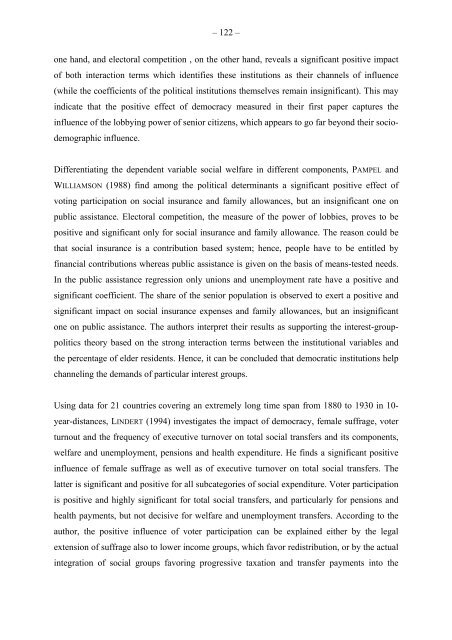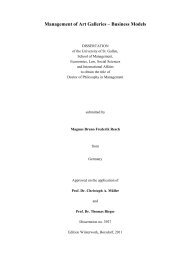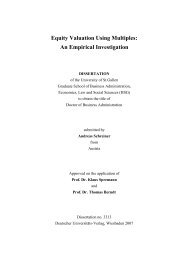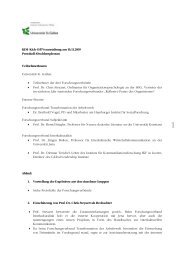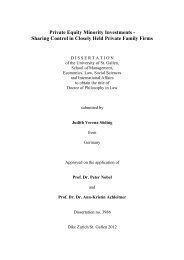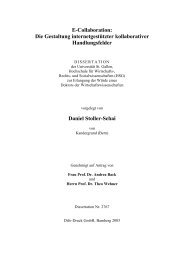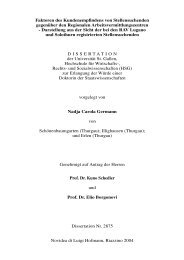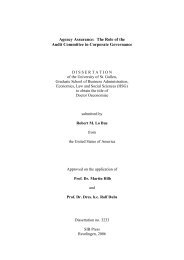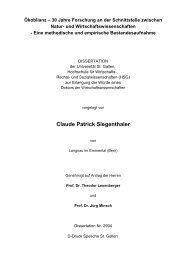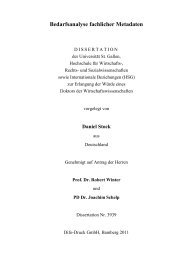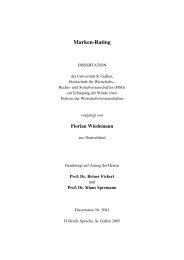The Impact of Direct Democracy on Society - Universität St.Gallen
The Impact of Direct Democracy on Society - Universität St.Gallen
The Impact of Direct Democracy on Society - Universität St.Gallen
- No tags were found...
You also want an ePaper? Increase the reach of your titles
YUMPU automatically turns print PDFs into web optimized ePapers that Google loves.
– 122 –<strong>on</strong>e hand, and electoral competiti<strong>on</strong> , <strong>on</strong> the other hand, reveals a significant positive impact<str<strong>on</strong>g>of</str<strong>on</strong>g> both interacti<strong>on</strong> terms which identifies these instituti<strong>on</strong>s as their channels <str<strong>on</strong>g>of</str<strong>on</strong>g> influence(while the coefficients <str<strong>on</strong>g>of</str<strong>on</strong>g> the political instituti<strong>on</strong>s themselves remain insignificant). This mayindicate that the positive effect <str<strong>on</strong>g>of</str<strong>on</strong>g> democracy measured in their first paper captures theinfluence <str<strong>on</strong>g>of</str<strong>on</strong>g> the lobbying power <str<strong>on</strong>g>of</str<strong>on</strong>g> senior citizens, which appears to go far bey<strong>on</strong>d their sociodemographicinfluence.Differentiating the dependent variable social welfare in different comp<strong>on</strong>ents, PAMPEL andWILLIAMSON (1988) find am<strong>on</strong>g the political determinants a significant positive effect <str<strong>on</strong>g>of</str<strong>on</strong>g>voting participati<strong>on</strong> <strong>on</strong> social insurance and family allowances, but an insignificant <strong>on</strong>e <strong>on</strong>public assistance. Electoral competiti<strong>on</strong>, the measure <str<strong>on</strong>g>of</str<strong>on</strong>g> the power <str<strong>on</strong>g>of</str<strong>on</strong>g> lobbies, proves to bepositive and significant <strong>on</strong>ly for social insurance and family allowance. <str<strong>on</strong>g>The</str<strong>on</strong>g> reas<strong>on</strong> could bethat social insurance is a c<strong>on</strong>tributi<strong>on</strong> based system; hence, people have to be entitled byfinancial c<strong>on</strong>tributi<strong>on</strong>s whereas public assistance is given <strong>on</strong> the basis <str<strong>on</strong>g>of</str<strong>on</strong>g> means-tested needs.In the public assistance regressi<strong>on</strong> <strong>on</strong>ly uni<strong>on</strong>s and unemployment rate have a positive andsignificant coefficient. <str<strong>on</strong>g>The</str<strong>on</strong>g> share <str<strong>on</strong>g>of</str<strong>on</strong>g> the senior populati<strong>on</strong> is observed to exert a positive andsignificant impact <strong>on</strong> social insurance expenses and family allowances, but an insignificant<strong>on</strong>e <strong>on</strong> public assistance. <str<strong>on</strong>g>The</str<strong>on</strong>g> authors interpret their results as supporting the interest-grouppoliticstheory based <strong>on</strong> the str<strong>on</strong>g interacti<strong>on</strong> terms between the instituti<strong>on</strong>al variables andthe percentage <str<strong>on</strong>g>of</str<strong>on</strong>g> elder residents. Hence, it can be c<strong>on</strong>cluded that democratic instituti<strong>on</strong>s helpchanneling the demands <str<strong>on</strong>g>of</str<strong>on</strong>g> particular interest groups.Using data for 21 countries covering an extremely l<strong>on</strong>g time span from 1880 to 1930 in 10-year-distances, LINDERT (1994) investigates the impact <str<strong>on</strong>g>of</str<strong>on</strong>g> democracy, female suffrage, voterturnout and the frequency <str<strong>on</strong>g>of</str<strong>on</strong>g> executive turnover <strong>on</strong> total social transfers and its comp<strong>on</strong>ents,welfare and unemployment, pensi<strong>on</strong>s and health expenditure. He finds a significant positiveinfluence <str<strong>on</strong>g>of</str<strong>on</strong>g> female suffrage as well as <str<strong>on</strong>g>of</str<strong>on</strong>g> executive turnover <strong>on</strong> total social transfers. <str<strong>on</strong>g>The</str<strong>on</strong>g>latter is significant and positive for all subcategories <str<strong>on</strong>g>of</str<strong>on</strong>g> social expenditure. Voter participati<strong>on</strong>is positive and highly significant for total social transfers, and particularly for pensi<strong>on</strong>s andhealth payments, but not decisive for welfare and unemployment transfers. According to theauthor, the positive influence <str<strong>on</strong>g>of</str<strong>on</strong>g> voter participati<strong>on</strong> can be explained either by the legalextensi<strong>on</strong> <str<strong>on</strong>g>of</str<strong>on</strong>g> suffrage also to lower income groups, which favor redistributi<strong>on</strong>, or by the actualintegrati<strong>on</strong> <str<strong>on</strong>g>of</str<strong>on</strong>g> social groups favoring progressive taxati<strong>on</strong> and transfer payments into the


